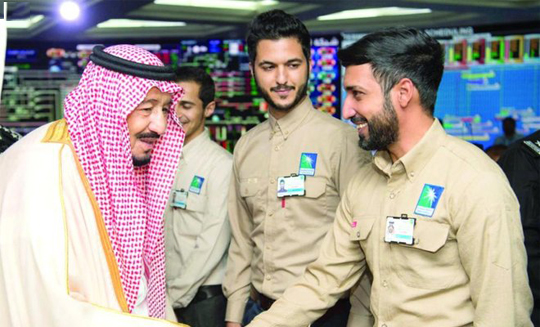Dhahran, Dec 2: King Salman on Thursday inaugurated six Saudi Aramco mega projects in the company’s main building in Dhahran.
The ceremony began with a speech by CEO Amin Nasser, who reviewed the company’s achievements since it was founded, and oil discoveries since the reign of King Abdul Aziz.

The inaugurated projects include the giant Khurais oil field.
Saudi Aramco said the prime goal of the Khurais project is to increase Saudi production of Arabian Light crude oil by 1.2 million barrels per day and gas by 420 million standard cubic feet.
The second project is increasing crude oil production in Manifa field, which is considered one of the largest crude oil production projects in the world.
The project has a capacity of 900,000 barrels of crude oil per day, 90 million standard cubic feet of non-associated gas, and 65,000 barrels of condensates.
The gas plant project in Wasit, north of Jubail Industrial City, is the latest gas plant that will help meet Saudi energy needs.
It is part of Saudi Vision 2030, which stresses the importance of doubling Saudi gas production and creating a national network for the expansion of its distribution activities.
This giant plant will contribute to raising Saudi gas-processing capacity by 20 percent, and providing clean energy necessary for water desalination stations and local power generation.
The Wasit project will save more crude oil for refining with high added value, and provides Saudi Aramco’s main gas with 1.7 billion standard cubic feet per day of sales gas, which contributes to the growth of the Kingdom’s petrochemical and manufacturing sectors.
The expansion of the crude oil field project in Shaybah includes the production of additional quantities of very light Arabian crude oil with a high value by 250,000 barrels per day, bringing total production capacity to 1 million barrels per day.
The project of increasing the production capacity of crude oil in the Shaybah field and the natural gas liquids plant will be an important component in the strategy of facing future energy challenges locally and globally.
It will also help the Kingdom maintain its share in the global oil market, and Saudi Aramco’s role as a leading supplier and reliable energy source in the world.
The project to extract natural gas liquids represents an important part of the diversification of sources of national economy and job-creation in the Kingdom.
It also supports the Kingdom’s strategy of reducing its reliance on liquid fuel to generate electricity and provide cleaner energy to meet local needs.
King Salman visited the headquarters of the King Abdulaziz Center for World Culture, whose aim is to encourage creativity, innovation and communication with different cultures and civilizations, and to promote Saudi efforts in building a knowledge-based economy and society.





Comments
Add new comment